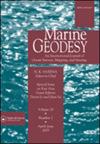水文测量路由问题的混合迭代贪婪算法
IF 1.4
4区 地球科学
Q2 GEOCHEMISTRY & GEOPHYSICS
引用次数: 1
摘要
摘要海道测量是海洋社会必不可少的一项工作,对海洋安全、经济发展、科学研究和环境保护具有重要意义。水文测量是一项定期和昂贵的活动;因此,需要仔细的水文测量规划。航道测量路线是航道测量规划的主要任务之一,我们不仅需要找到最有兴趣的海域(通常通过风险度量,综合航行风险,环境影响和/或数据过时进行评估),而且还需要找到最短的航道进行航道测量。在本文中,我们首先尝试制定航道测量路线问题,然后开发一种高效的混合迭代贪心算法来解决该问题。该算法分为三个阶段,即第一阶段使用模因算法寻找良好的起始点,第二阶段使用全局贪婪算法探索全局搜索空间,第三阶段使用局部贪婪算法利用局部搜索空间。在法国进行了五个实际案例研究,以验证所开发算法的性能。本文章由计算机程序翻译,如有差异,请以英文原文为准。
A Hybrid Iterated Greedy Algorithm for Hydrographic Survey Routing Problem
Abstract Hydrographic surveying is a necessary task in the maritime community, which can contribute to maritime security, economic development, scientific research, and environmental protection. Hydrographic surveying is a regular and costly activity; hence, careful hydrographic survey planning is required. Hydrographic survey routing is one of the main tasks in hydrographic survey planning, in which we not only need to find the most interesting maritime area(s) (usually evaluated through a risk measure, aggregating navigation risk, environmental impact, and/or data obsolescence), but also the shortest route to do the hydrographic surveying. In this article, first, we attempt to formulate the hydrographic survey routing problem and then develop an efficient hybrid iterated greedy algorithm to solve the problem. The proposed algorithm consists of three stages, that is, Stage 1 with a memetic algorithm to find a good starting point, Stage 2 with a global greedy algorithm to explore the global search space, and Stage 3 with a local greedy algorithm to exploit the local search space. Five real case studies in France are conducted to validate the performance of the developed algorithm.
求助全文
通过发布文献求助,成功后即可免费获取论文全文。
去求助
来源期刊

Marine Geodesy
地学-地球化学与地球物理
CiteScore
4.10
自引率
6.20%
发文量
27
审稿时长
>12 weeks
期刊介绍:
The aim of Marine Geodesy is to stimulate progress in ocean surveys, mapping, and remote sensing by promoting problem-oriented research in the marine and coastal environment.
The journal will consider articles on the following topics:
topography and mapping;
satellite altimetry;
bathymetry;
positioning;
precise navigation;
boundary demarcation and determination;
tsunamis;
plate/tectonics;
geoid determination;
hydrographic and oceanographic observations;
acoustics and space instrumentation;
ground truth;
system calibration and validation;
geographic information systems.
 求助内容:
求助内容: 应助结果提醒方式:
应助结果提醒方式:


